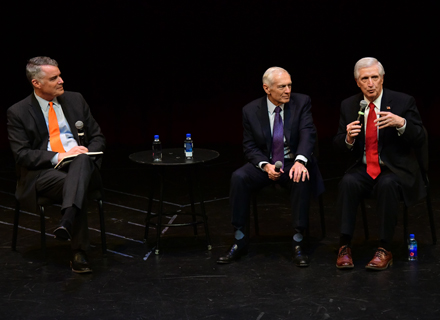
Pete Peterson moderates a bipartisan discussion with General Wesley Clark and Secretary Andy Card
On February 5th 2020 the third ever impeachment trial of a U.S. President concluded. While President Trump was impeached by the Democratically-controlled House of Representatives on two counts, the Republican-controlled Senate acquitted the President on both charges. While many Americans are delving into the political merits of either side, one thing this trial underscores more than anything is the growing gulf between the United States’ two political parties. In this wake of heightened partisan politics, The Los Angeles World Affairs Council & Town Hall convened a conversation that many Americans are not having but may be looking for: an intentional and civil bipartisan discussion about the country’s future.
Addressing a packed crowd at the Moss Theater, two nationally-recognized political leaders from both sides of the political spectrum engaged in a discussion centered on how Americans can have civil, civic dialogue—and in turn, how this act can strengthen our democracy. The conversation featured Former NATO Supreme Allied Commander, General Wesley K. Clark (ret.) and Secretary Andrew Card, former White House Chief of Staff and the 11th Secretary of Transportation. Pete Peterson, Dean of the School of Public Policy at Pepperdine University, moderated what started as a “Bipartisan Discussion on National Security,” and evolved into a nuanced, hopeful conversation about America’s future.
Both panelists began by offering historical context on how their respective parties have changed over their lifetimes. General Clark opened with:
“This is supposed to be a ‘post-partisan’ political discussion. The idea was to get a former Democrat, or candidate -- that's me, and a former Republican participant, that's Andy, and put us together on the stage and talk about the issues that are affecting America today in a way that provides illumination, that provides a context, that provides facts that help us bridge the partisan divide that we see.”
While both political parties have evolved over the decades, this intra-party evolution has become extremely rapid over the past few years. Furthermore, both parties have seen the emergence of populist movements, with Trump on the right and Sanders on the left. Peterson honed in on this similarity, prompting a necessary discussion on just how much both parties have changed and what this means for the future. Analyzing similarities between the two populist movements provides an interesting illumination to today’s shifted partisan politics. Peterson noted that in 2016, polls captured similarities between Sanders and Trump supporters on the issue of America’s role in the world. Both side’s voters believed the U.S. needs to become far less involved in other countries’ conflicts.
On this point, Card offered an interesting anecdote about one of his neighbor’s in New Hampshire. In 2016, his neighbor’s yard boasted a large Bernie Sanders sign until Sanders lost the nomination. Immediately, the neighbored replaced the sign with one boasting Trump’s name. When Card asked his neighbor about the shift, the neighbor said he was simply looking for someone to “shake up the place.” Both Sanders and Trump were perceived as outsiders to ‘politics as usual,’ something many voters were desperate for in 2016.
While a casual observer may assume Sanders and Trump supporters are the most ideologically opposed – this story illuminates an emotional similarity that some voters in the two groups feel: that politics has left them out, overlooked their problems, and failed to improve their lives. And it’s not just Card’s neighbor who demonstrated this particular party shift. Analysis shows that roughly 12% of Sanders supporters defected to Trump in the 2016 general election. While voters defect to the opposite party in every presidential election, what’s striking with Sanders-Trump voters is that these two candidates appear to be entirely ideologically opposite. Therefore, the very existence of Sanders-Trump voters proves that our current partisan divides – even those that appear the most radical and divisive – are maybe not as clean cut as most people initially assume.
From this conversation on where the parties have been and where they are now, Clark and Card made their case for the importance of civic engagement and public service. Card argued for the necessity of being skeptical but not cynical of government because yes, democracy is imperfect, but this government is ours:
“Compromise is not a dirty word. Invite people to have conversations. Educate them don’t belittle them. Seek the truth, have the courage to learn, have the courage to teach others and then you’ll make a difference but you can’t just do it from the sidelines you have to get into the game and we’re inviting you to get into the game”
In having this ‘post-partisan conversation,’ looking at issues facing America from the lens of the struggles of the country as a whole, Clark and Card elevated the idea that hyper-partisan polarization is, in many ways, a symptom of the missing sense of common purpose. To fix this, both Card and Clark suggested all people get involved in some form of national service. General Clark argued:
“We should be calling our young people to work together to build a better country. There is so much to do in this country on the environmental side, so much of our national forests are going to be gone. And we know how to organize groups. We could do this.”
From civil dialogue to public service, there are places for Americans to work towards a hopeful future – but this requires the courage to get into the game.
By Claire Krelitz
